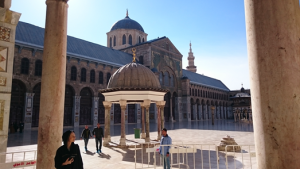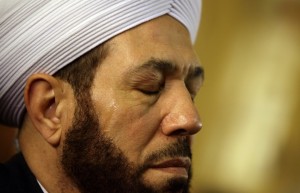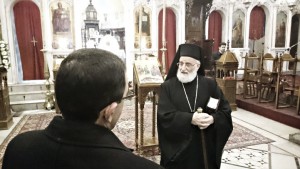Voices from Syria: Reports from Inside Syria
by Reverend Andrew Ashdown. Part 1

“‘Freedom?’ I hate the word ‘Freedom’. ‘Freedom’ to me means guns and bullets, suicide bombings and killings. I have deleted the word from my vocabulary. Don’t talk to me about ‘freedom’. We had peace before they brought us ‘freedom’.”
I was sitting in an old Damascene house – the home of a Syrian Christian woman, situated within the walls of the Old City of Damascus. A teacher, who has for years taught in a Muslim school, with Sunni, Shia, Christian, Druze children all learning together, talks passionately and emotionally, as she laments the situation in Syria.
The room in which I am sitting, her living room, has twice received a direct hit from ‘moderate rebel’ positions in the city. She shows me the heavy, jagged metal shards of the shell that scattered across her courtyard. Fortunately, she and her young family were out. The shattered windows have plastic covering them
“I will not spend the money to repair them until there is peace, and we can be sure no more shells will come,” she says.
“What is this war? We were living in peace, and everything was fine, until they started talking about ‘freedom’. Now, we don’t know if we will live or die. People die just for being in the wrong place, when a shell lands. I used to live quite happily, with my Muslim and Christian friends. Now I think how can I afford the most basic things? What cost me five Syrian pounds before the conflict, now costs me one hundred Syrian pounds. Why? Because of ‘freedom’. We now have a shortage of water and electricity. Everything is difficult. Many people have left – not because of the President or the Government, but because of the crisis. I believe in the Government; I believe in the Army. I feel sorry for the soldier who dies for his country. He is the real martyr.”
I ask her what she thought of the international community. Her response is:
“Stay away from Syria. Leave Syria alone. If two brothers fight, they can resolve their differences. Syria needs time, but I feel sure that we will have peace again. We have always been a people that lives together.”
Ommayad Mosque, Damascus 2016
My Connections to Syria
I travelled to Syria after a five week stay in Lebanon, where I undertook an intensive Beginners Course in Arabic. During my time in Lebanon, I also visited the staff of a Christian agency that has been working closely with Syrian refugees for the last four years; met with faith leaders in Beirut; talked with Syrian refugees on the streets; and travelled for a long weekend to Erbil, in Iraq, visiting Syrian and Iraqi refugees both in the city, and at a Syrian Kurdish refugee camp close to ‘IS’ front-lines, west of Erbil.
Prior to the conflict, I had visited Syria at least four times, and had travelled throughout the country, both as an individual, and leading groups. This however was my fourth visit to Syria since April 2014. On previous visits, I have been a member of delegations, and have travelled throughout the government-controlled areas of the country, meeting with Christians of all denominations. I have interacted with Sunni, Shia, Alawite, Kurds, Druze. I have visited faith and community leaders. I have met with political leaders including all the leaders of the internal opposition parties and finally I have spent time in refugee camps and with internally displaced people – in Homs, Damascus, Yarmouk, Maaloula, Saidnaya, Qara, Tartous, Lattakia.
For this latest visit, I travelled independently, without any accompaniment; and without security. I was free to meet whom I please, and to travel at my own risk. I travelled to Damascus in a shared taxi that I arranged myself from Beirut.
My meeting with Huda, was on the first full day of this visit. I had decided that, being a Sunday, I would focus on a Christian perspective. And so I walked from my hotel, about 3 kms to and through the Old City and to the Greek Melkite Cathedral in the old Christian Quarter, just off ‘Straight Street’, and a short distance from where St. Paul met Ananias.
The streets of the city were only beginning to wake up, but wherever I walked, I was greeted with warm smiles and welcomes. During the subsequent week walking the streets of Damascus, I did not see one other ‘white’ European face.
The car-park of the heavily fortified Four Seasons 5* hotel where any journalists, NGOs and UN staff stay, was filled with official four-wheel drive vehicles, but my experience during every one of my visits to Syria, would suggest that most stay firmly installed in the luxury confines of their hotel. They exit only for official work and do not integrate with Syrian society.
The fact is that very few people are travelling in Syria and meeting with, and talking to ordinary people in the city or the country. Walking through Damascus now is a sobering experience. It is and always was a beautiful city. Now, of course, there are army checkpoints everywhere and thank goodness that they are there to prevent terrorist or car-bomb attacks in the city.
Sanctions are causing shortages of supplies. Costs have sky-rocketed…infact I could barely afford to cover my stay and eat with the money I had left. The city is looking tired and unkempt. People are not as well turned out as they used to be. And everywhere, you see people sleeping on the streets or begging. It is heart-wrenching.
Whilst some of the suburbs that were occupied by ‘rebels’ have been severely pummelled with bombardment (it is possible to see some of the devastation from the road into the city), the city centre has also received five years of random mortar attacks, leaving it scarred, and vulnerable. Despite this, apart from Tartous, it is still, probably, the safest place in the country.
Yet, life goes on. People go about daily tasks, drinking coffee and smoking ‘argile’ in the cafes. Schools are still operating. Hospitals are still functioning, though profoundly stretched due to a shortage of staff and supplies. As one person said to me: “Despite the hardships, we must carry on. Carrying on with normal life is our resistance to terrorism”
Grand Mufti of Syria. Dr. Hassoun, Voice of Moderation and Peace
It was a wonderful surprise to receive an invitation to meet with the Grand Mufti of Syria. It is always a joy to meet him. Vilified and misrepresented in the West, Dr.Hassoun is one of the most moderate Muslim leaders and theologians in the region – passionate about pluralism and mutual respect between faiths, and insistent on the importance of the indigenous Christian presence, and our mutual fellowship under God.
In the political and religious fragmentation in the region, he is a spiritual leader of the highest calibre who we ought to be listening to and engaging with.
[And before anyone raises the oft-repeated accusation that he once ‘threatened’ the West with suicide bombers, he has consistently clarified the remark which was a warning of what could happen if we continued in our policies. Even my own limited knowledge of Arabic, recently acquired, has shown me how easily it can be poorly translated….and of course used for political purposes. In fact, if anything, his words have proved disturbingly prophetic. ]
I count it a privilege to know him. He is a spiritual leader of stature and dignity.
One afternoon, I was invited to give an interview on Syrian TV in order to share my impressions of Syria both before and since the beginning of the conflict. To discuss the view of Syria in the West and to share my own thoughts and impressions from meeting numerous people from all communities around the country.
Entering the State TV building is a bit like entering a bunker. Situated in a heavily fortified compound, the main office areas are deep within the building. Windows are covered over to protect from sniper fire and exploding shells. The main studio is below ground behind heavy steel doors.
I received a warm welcome from the staff, management and TV presenters… many of whom are young and passionate about their country. A few days later, the 40 minute programme was broadcast as I sat with friends in a local café.
The following day, I was touched when, walking in the streets of the city, a shopkeeper rushed out and heartily thanked me for my words and for visiting the country. A few hours later, I received a personal ‘phone call from the Grand Mufti, congratulating me for the interview and thanking me for my words.
Following the recording of the interview, I was driven back to my hotel by a young female presenter. She was fluent in English. Her eyes were sad and she spoke slowly and with a sad smile. She asked about my age and I made a joke about being young at heart. Her response I thought was poignant. She said, with tears in her eyes:
“Seeing you here fills me with joy and sadness: joy because you have come to see the real situation and listen to the people; sadness because seeing you reminds me of the days when foreigners would come and visit our beautiful country. I hope one day they will come again. I am 28, but I feel like I am 60. Our youth has been taken from us. All we can do is hang on to hope…”
The Greek Melkite Patriarchate, Damascus.
I arrived early at the Greek Catholic Melkite Patriarchate for their service, chancing upon a wonderful scene – the Patriarch Gregorios III Laham alone with two priests doing Matins. He was clearly training them in the chanting, with a beautiful mix of firm direction, genuine devotion, humility, mild humorous rebuke when they got it wrong, and constant explanation.
He even stopped to welcome me warmly and explain what was going on. Later, the Church filled for the Mass in which I was allowed to partake. As I met and mingled with members of the congregation afterwards, I detected a deep sadness and weariness in people’s eyes, and in their words.
Christians have been a very part of the fabric of Syrian society since the earliest days of the Church. The country is full of ancient Christian shrines and holy places, some of which are places of pilgrimage for Muslims too. Yet, in parts of Syria, the Christian presence is being decimated, and historic Churches are being damaged and destroyed by the very forces that the west are supporting.
All communities acknowledge the gulf that has developed in trust between the communities during this conflict, and express a deep sadness given the historic tolerance and life that the communities shared prior to the conflct. And yet, after the service, a young Syrian woman approached me and said: “We will stay. This is our home. And Syria would not be Syria without the Christian community.”
It has been a privilege to meet with Patriarch Laham on several occasions over the years. He has always been consistent in his requests that the outside world acknowledges and respects the diversity of Syria. He has always celebrated Syria’s extraordinary plurality and secularity.
Unfortunately, as with the majority of the Christian leaders in Syria, who call upon western nations to cease supporting outside forces that are promoting sectarianism and violence, his cry, too, remains unheeded.
[End of Part One]
Revd Andrew Ashdown is an Anglican priest in England. He has been visiting and leading groups to the Middle East for over 25 years, and has visited Syria four times since April 2014, both as a member of faith delegations, and more recently independently. Andrew is undertaking research into Christian/Muslim relations in the region.




